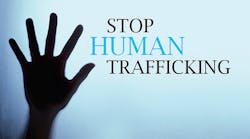Over the past few years, awareness of human trafficking in the supply chain has increased. Many companies, and especially transportation companies, have devised programs to help combat this devasting problem.
The U.S. Chamber Task Force to Eradicate Human Trafficking published a report this month that gives advice on policies that companies can implement to stop this from happening.
The scope of the problem, where almost 21 million people are victims, is often hard to ascertain as the actions used by traffickers often appears, legitimate, according to an article by Cassie Hodges of the U.S. Chamber of Commerce.
To assist companies looking to take action, the U.S. Chamber of Commerce studied current companies who have superficially policies and came up with these tips.
Involve C-suite leadership in identifying risky business partners and locations
When it comes to fighting trafficking effective leadership comes from the top. Many companies have issued public policy statements, committing their leadership to respect human rights, which includes eradicating human trafficking. An increasing number of companies have board committees dedicated to social responsibility efforts, including addressing human trafficking in their supply chains.
Companies have used in-house or third-party analysts to identify the areas where their business partners and operations may pose human trafficking risks. This0 enables companies to focus their scrutiny and resources — for example, by conducting more intensive and targeted due diligence — to help eliminate such risks.
Measure and monitor problem and solutions
Effective companies have developed clear policies explicitly prohibiting human trafficking, including incorporating a zero- tolerance policy for human trafficking in supplier selection procedures. These policies apply to both company operations and the supply chain, including business partners like private employment agencies. These policies have also been integrated into contracts with suppliers and business partners.
Incorporating training programs to educate relevant representatives on human trafficking has also proved to be effective. Some firms conduct joint training and awareness-raising exercises and media campaigns with appropriate business partners and external stakeholders. Certain nonprofits and government agencies provide resources that assist with these training. For instance, the Department of Homeland Security, as part of its “Blue Campaign,” provides a toolkit to educate employees in the hospitality industry.
Using in-house or third-party consultants to develop goals and key performance indicators and monitoring adherence to those goals is essential. Some companies require auditors to provide country-level reports on the political and socioeconomic situations of the countries in which they operate and how those situations affect workers in those countries, and these efforts can go a long way in keeping the task on top of mind.
Work with suppliers and their employees to ensure compliance
Companies often require business partners to periodically certify that they have complied with the companies’ requirements on identifying and eradicating human trafficking from their operations. These certification requirements are integrated into the companies’ contracts.
Some companies require business partners to provide access to a confidential helpline directly connecting the suppliers’ employees with the companies. These helplines allow workers to complain to the companies without fear of retaliation from suppliers.
Examine production planning and recruitment practices
Companies that rely on business partners to manufacture and fulfill orders have recognized that certain business conditions may create additional risks of involving entities that are susceptible to forced labor. As such, businesses have sought to manage their demand to ensure that products are produced by known and trusted partners.
Recruiters function as a bridge between workers and employers and, at their best, can provide guidance and assist in matching workers with open positions. However, certain recruiters charge recruited workers fees they cannot reasonably be expected to repay. This leads to debt bondage in which the worker is forced to give up most or all of his or her salary until the fees are repaid. To combat this situation, companies have instituted policies barring recruiters from charging prohibited or inappropriate recruitment fees or any related costs to workers.
Take action in the community
Companies have increasingly launched global, national, or local campaigns in cooperation with the media to promote in the communities in which they operate. Companies have also worked with international organizations, nonprofits, and business or trade associations in establishing industrywide or countrywide task forces on human trafficking dedicated to raising awareness.



